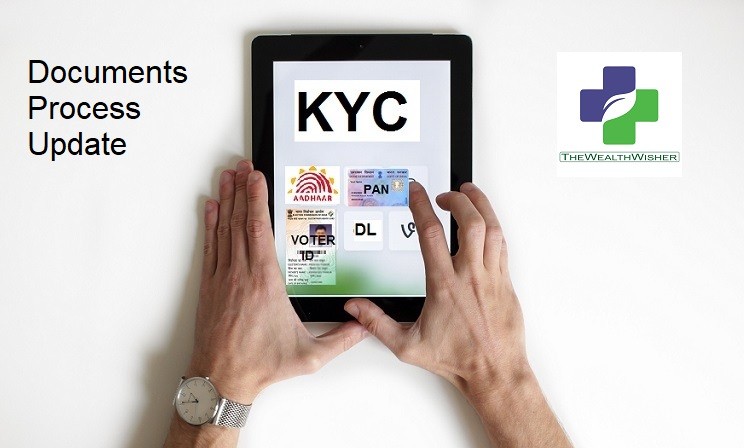My congratulations if you are reading this article and have made up your mind to invest in the mutual fund for the first time. But the first question will be – What is Mutual Fund KYC? Next will be how to start investing? I will detail the procedure of making your first investment in mutual funds in the next 2 posts. We will cover:
- What is Mutual Fund KYC? Significance, Details, Process of MF KYC
- How to make your first Purchase in Mutual Funds? The process with Documentation required. (Next Post)
The process of investing in mutual funds is fixed for all mutual funds operating in India.
Let’s start with KYC first.
What is Mutual Fund KYC?
KYC or Know Your Customer is fundamental documentation to all financial services whether it is a loan or bank account or a credit card. The entity providing you financial service should know its customer. It includes validating financial (PAN) & residential (Address Proof) of the person investing.
If you have a Demat a/c or trading in Equities, chances are you already have a KYC. This can be checked through links mentioned below.
You may like to read MF Taxation for Current Year
You may like to read MF Taxation – Some More Details
Good news is KYC is centralized. Means once you do it once, you do not need to repeat it with every purchase. Once done MFs can access your KYC through your PAN.
Following are the links where status of KYC can be checked:
https://kra.ndml.in/
https://camskra.com/
https://www.karvykra.com
https://www.cvlkra.com/
https://www.nsekra.com/
MF KYC Documentation
You need to fill a form that can be downloaded from AMFI Website. The form is also available at mutual fund offices, R&T Offices, websites of various Mutual Funds & with your Financial Advisor.
KYC form is of 2 types: Individual (Resident & NRIs) & Non-Individual (Proprietor, Partnerships Companies & LLPs)
What is Mutual Fund KYC? Documents for KYC of Individuals
- Copy of PAN
- Copy of Address Proof (Aadhar is preferred. In case you do not have Aadhar a Driving License, Voter ID or Bank Statement or Post Office Bank can also be used. Also other proofs include Utility bill which is not more than two months old of any service provider (electricity, telephone, post-paid mobile phone, piped gas, water bill); Documents issued by Government departments of foreign jurisdictions and letter issued by Foreign Embassy or Mission in India; Identity card with applicant’s photograph and address issued by any of the following: Central/ State Government Departments, Statutory/Regulatory Authorities, Public Sector Undertakings, Scheduled Commercial Banks, Public Financial Institutions, Colleges affiliated to Universities, Professional Bodies such as ICAI, ICWAI, ICSI, Bar Council, etc., to their Members; and Credit cards/Debit cards issued by Banks.)
- Proof of Overseas Address (Only for NRIs)
- One Photo
Documents for KYC of Non-Individuals
As per your category following documents need to be attached following documents with the KYC form:

What is Mutual Fund KYC? Process of KYC
 You need to fill the form & attached documents. The documents need to be self-attested and verified with originals by a designated person. This is called In-person Verification (IPV). The designated person to carry out IPV can be:
You need to fill the form & attached documents. The documents need to be self-attested and verified with originals by a designated person. This is called In-person Verification (IPV). The designated person to carry out IPV can be:
- Authorized officials of Asset Management Companies (AMC).
- Authorized officials of Registrar & Transfer Agent (R&T) acting on behalf of the AMC.
- KYD compliant mutual fund distributors.
- Notary Public, Gazetted Officer, Manager of a Scheduled Commercial/Co-operative Bank or Multinational Foreign Banks (Name, Designation & Seal should be affixed on the copy).
- In case of NRIs, authorized officials of overseas branches of Scheduled Commercial Banks registered in India, Notary Public, Court Magistrate, Judge, Indian Embassy/ Consulate General in the country where the client resides are permitted to attest the documents.
- Government authorized officials who are empowered to issue Apostille Certificates.
Once this is done you can visit mutual fund office or R&T (Registrar & Transfer Agent). Most of them insist on doing KYC with a transaction (means first purchase or KYC). But you can tell them that you will decide later for investments.
If the documentation is ok, after some time you can check your KYC on CVL-KRA website using your PAN number. First, it will show “in process”. After 7-10 days when KYC agency verifies the physical documents, the status changes to “KYC REGISTERED”. All set now…
Learn a new way to Make payment for IPOs & New Funds Offers
Additional information:
- KYC can be changed using the same form in case name or address or contact details change.
- KYC can be modified (in case of some error) by the same form.
- You can also apply for “PAN Exempt KYC” if you do not have a PAN Number. For such KYC only Rs 50000 can be invested per investor/per folio/per annum, whether Lumpsum or by SIP.
KYC is an important process and if you find trouble take help of your financial planner. If you don’t have one, reach out for one and engage his services as you will need his advice too for investments.
And, we are there – Happy to Help. Pls email or ask your queries in the comments section below.








